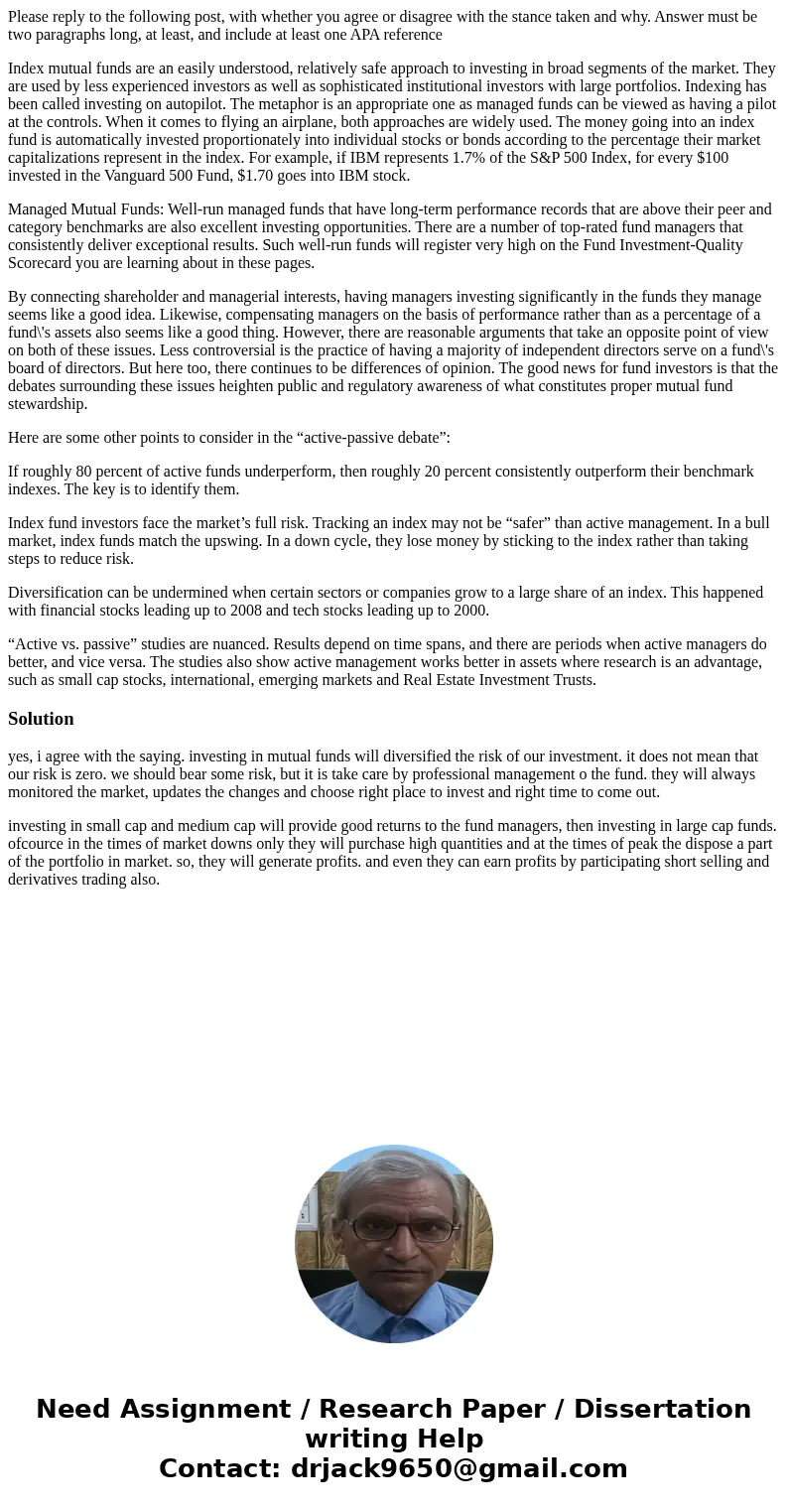Please reply to the following post with whether you agree or
Please reply to the following post, with whether you agree or disagree with the stance taken and why. Answer must be two paragraphs long, at least, and include at least one APA reference
Index mutual funds are an easily understood, relatively safe approach to investing in broad segments of the market. They are used by less experienced investors as well as sophisticated institutional investors with large portfolios. Indexing has been called investing on autopilot. The metaphor is an appropriate one as managed funds can be viewed as having a pilot at the controls. When it comes to flying an airplane, both approaches are widely used. The money going into an index fund is automatically invested proportionately into individual stocks or bonds according to the percentage their market capitalizations represent in the index. For example, if IBM represents 1.7% of the S&P 500 Index, for every $100 invested in the Vanguard 500 Fund, $1.70 goes into IBM stock.
Managed Mutual Funds: Well-run managed funds that have long-term performance records that are above their peer and category benchmarks are also excellent investing opportunities. There are a number of top-rated fund managers that consistently deliver exceptional results. Such well-run funds will register very high on the Fund Investment-Quality Scorecard you are learning about in these pages.
By connecting shareholder and managerial interests, having managers investing significantly in the funds they manage seems like a good idea. Likewise, compensating managers on the basis of performance rather than as a percentage of a fund\'s assets also seems like a good thing. However, there are reasonable arguments that take an opposite point of view on both of these issues. Less controversial is the practice of having a majority of independent directors serve on a fund\'s board of directors. But here too, there continues to be differences of opinion. The good news for fund investors is that the debates surrounding these issues heighten public and regulatory awareness of what constitutes proper mutual fund stewardship.
Here are some other points to consider in the “active-passive debate”:
If roughly 80 percent of active funds underperform, then roughly 20 percent consistently outperform their benchmark indexes. The key is to identify them.
Index fund investors face the market’s full risk. Tracking an index may not be “safer” than active management. In a bull market, index funds match the upswing. In a down cycle, they lose money by sticking to the index rather than taking steps to reduce risk.
Diversification can be undermined when certain sectors or companies grow to a large share of an index. This happened with financial stocks leading up to 2008 and tech stocks leading up to 2000.
“Active vs. passive” studies are nuanced. Results depend on time spans, and there are periods when active managers do better, and vice versa. The studies also show active management works better in assets where research is an advantage, such as small cap stocks, international, emerging markets and Real Estate Investment Trusts.
Solution
yes, i agree with the saying. investing in mutual funds will diversified the risk of our investment. it does not mean that our risk is zero. we should bear some risk, but it is take care by professional management o the fund. they will always monitored the market, updates the changes and choose right place to invest and right time to come out.
investing in small cap and medium cap will provide good returns to the fund managers, then investing in large cap funds. ofcource in the times of market downs only they will purchase high quantities and at the times of peak the dispose a part of the portfolio in market. so, they will generate profits. and even they can earn profits by participating short selling and derivatives trading also.

 Homework Sourse
Homework Sourse